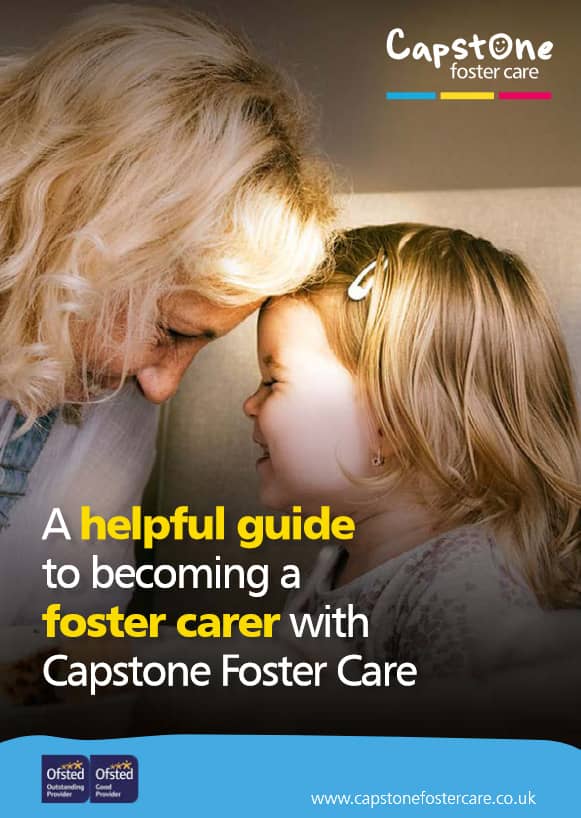


Fostering a disabled child
The role of an independent fostering agency
How to choose a foster care agency
Can I choose who I foster?
What are the benefits of fostering with an independent fostering agency?
What happens when a child is taken into care?
Fostering process: what happens on an initial home visit?
Fostering with local authority vs independent agency
A complete guide to becoming a foster carer
How Are Children in Foster Care Matched with Carers?
Foster Care Budgeting Tips
Becoming A Foster Carer
What is a Care Leaver?
What is a Foster Carer?
Fostering Regulations
How long does it take to become a Foster Carer?
What are the Foster Care requirements?
Changing IFA - Transferring to Capstone
8 reasons why a child may be taken into care
Fostering as a Career
Can you foster if you smoke or vape?
A guide to fostering assessments
LGBTQ+ Fostering
Equality, Inclusion & Anti-discriminatory Practice in Foster Care
What can disqualify you from foster care?
Can you foster if you’re on benefits?
Top transferable job skills to become a foster carer
Fostering as a same sex couple
Fostering while renting
Can you foster if you have mental health issues?
Is there an age limit for fostering in the UK?
Do foster carers get a pension?
How to foster a child: A step by step guide
How do DBS Checks Work?
Can I foster if...?
Mythbusting the top 10 Foster Care Myths
Can I foster if I am disabled?
LGBT Fostering Mythbusting
Can I foster if I have pets?
Can I Foster A Child?
Can I Foster and Work?
Can you Foster with a Criminal Record
Can Single People Foster?
LGBT Family and Foster Care
Fostering across Cultures
Muslim Fostering
Christian Foster Care
Sikh Fostering
Empty Nest Syndrome and Foster Care
Can I Foster?
What is the difference between residential care and foster care?
Fostering Babies and Young Children
What is Kinship Care?
Fostering Babies - Myths
Focusing on Parent & Child Fostering
Fostering Siblings
Fostering Teenagers
Fostering Teenagers - Breaking down the Myths
Fostering Unaccompanied and Asylum Seeking Children
Mother and Baby Foster Placements
Private Fostering
How does therapeutic fostering work?
Young Children Fostering Placements
Difference between short and long-term fostering
Types of self-harm
A Guide to the Foster Care Handbook
Reunification and Birth Parents: A Guide for Foster Carers
What is an EHC Plan? A Guide for Foster Carers
How to prepare a child for becoming a care leaver
Children who foster: impact of fostering on birth children
Fostering LGBTQ+ Youth
How to prepare your home for a foster child
How to help a lonely child: A Guide for Foster Carers
What are the National Minimum Standards for Fostering Services?
10 tips for foster children's education
How to prepare your foster child for secondary school
Tips for coping when foster placements end
Tips for foster parents during Coronavirus
What happens if foster parents get divorced?
5 ways to manage Mother's Day with foster children
Tips for managing foster children's bedtime routines
How to handle foster child bullying
Fostering allowances and the gender pay gap
What discounts can foster carers get?
How to adopt from Foster Care
5 ways to manage Father's Day for children in foster care
8 most common fostering challenges
FosterTalk Membership with Capstone Foster Care
Supporting foster children's contact with birth families
A guide to independent fostering
Keeping Children Safe Online: A Guide For Foster Carers
Movies About Foster Care
Play-based learning strategies for foster carers
A Guide to the Staying Put Program
Why Foster Parent Wellbeing Matters
How to deal with empty nest syndrome
How to recognise signs of depression in foster children
Can you take a foster child on holiday?
Tips and advice on fostering with a disability
10 tips on connecting with your Foster Child
Fostering vs Adoption - What's the difference?
How Fostering can change a future
How to adopt from Foster Care
How to encourage children to read in Foster Care
How to prepare a Foster Child's bedroom
Reading and Storytelling with Babies and Young Children
Supporting Children's Learning
The 20 most recommended books Foster Carers and young people should read
Things you can do when your children leave home
The impact of early childhood traumas on adolescence and adulthood
Anxious Disorders in Foster Children
What is sexual abuse and sexual violence
Foster Child behaviour management strategies
Foster Parent Advice: What to expect in your first year of fostering
Capstone's twelve tips at Christmas
10 celebrities who grew up in Foster Care
Could Millenials be the solution to the Foster Care crisis?
Do you work in Emergency Services?
Form F Assessor and Assessment Training
Foster Care Fortnight
Improving Children's Welfare - Celebrating Universal Children's Day
New Year - New Career - Become a Foster Carer
Young People Charities
If you’re interested in fostering and want to find out more about the process, you may be aware that to be approved as a foster carer, you'll need to be assessed. Fostering assessments are there to make sure that foster families are able to provide a safe, suitable and loving home.
It’s understandable if you’re interested in fostering that you might be feeling a bit anxious about the assessment process. This guide will explain the different types of assessments that are carried out during the fostering process and explain exactly what happens so you can be prepared and have nothing to worry about.
A fostering assessment, otherwise known as the Form F assessment, is a series of questions to assess if fostering is right for you. You’ll be required to give personal info about your circumstances and health and give references. You’ll also be asked detailed questions about you and your family so that the social worker can get to know you and your personality. The purpose of this is to understand how suitable you are for fostering. As part of the assessment, social workers will visit your home and you could be invited to meetings to discuss your assessment too.
The fostering assessment takes between 4-6 months to process. This might seem like a long time, but because a child’s well-being is central to the assessment it’s important that potential foster carers are reviewed properly. After your first home visit, you’ll be assessed across spaced-out meetings with your assessor and social worker. The more readily available you are for home visits the faster the process is likely to be for you.
As well as the standard fostering assessment, also known as the Form F assessment. Here at Capstone, we carry out three different types of fostering assessment. The type of fostering assessment that you’ll be required to take will depend on the level of experience you have in fostering, or if you need any extra help to become a foster carer.
Streamlined fostering assessments are a fast track through the fostering assessments, this is typically for foster carers who are transferring from another agency or who are able to dedicate more time to a more streamlined assessment while still meeting all statutory requirements.
A nurturing fostering assessment is a type of fostering assessment that we provide for people who are really interested in fostering but perhaps need a bit more support to understand exactly what fostering is. We’ll start the usual background checks, but we won’t contact a social worker immediately. Instead, we’ll supply you with plenty of resources and training to help you better understand what fostering entails and help to make the decision on whether fostering is the right career for you.
As part of the fostering process, you’ll be asked a range of questions, most of these will be practical questions or questions about your circumstances so you won’t need to revise your answers. It’s also important to remember that the Form F assessment isn’t designed to catch you out – it’s designed to help us get to know you better.
Some of the typical topics include;
During your assessment, you’ll also have various checks. You’ll need to provide references from your previous employers. You’ll also need a medical check from your GP, the cost of which is covered by Capstone Foster Care. You’ll also need a DBS check and we’ll need to check your criminal record. Other safety checks include making sure your gas and electric safety certificates are valid and in date.
Once you’ve been approved, there are various different types of foster care you could be asked to consider. This could include long-term or short-term foster care, it could also include therapeutic foster care. As a foster carer with Capstone, we’ll provide you with all the training you need to care for your foster child.
Ready to apply for your career in foster care? Learn more about how to apply to become a foster parent now. Alternatively, if you want to know more about fostering pay or advice on how much foster parents get paid, contact Capstone Foster Care on 0800 012 4004.
If you’ve got any questions or would like to find out more about fostering with Capstone, fill out the form below.
An experienced fostering advisor from your local area will then be in touch.

Start the conversation today. Our team of friendly advisors are on hand to answer any foster care questions you may have. We can offer you honest and practical advice that can help you decide if becoming a foster carer is the right path for you.


